HAEC EST PHILOSOPHIA MEA
 I. Ontology
I. Ontology
"My Philosophy" sounds pretentious, doesn't it? It gives the
impression one has
developed a philosophical system totally on his own: imitatio Platonis.
What I mean by
that term, of course, is the corpus of convictions and beliefs I adhere to.
Are any of them
original?
Candidly, I neither know nor care. They simply are. I share them with
you, motivated by
the hope - perhaps illusory - that you may find them interesting and be
motivated to present
yours. Who knows, you might engender others to think!
The Primal Question (which I don't think can be
answered) is
"Who (or what) am I?": the
Enigma of Ontology. Am I a Shadow at the Back of the Cave, like everything
else? Perhaps
bothering with a question which cannot be answered is prima facie proof
of severe neurosis.
Then again, it may be reflective of a Great Soul. After all, complying with
the singular
Divine
Commandment of my ancestral Gods to know myself seems predicated upon coming
to grips
with what I am.
When I was a small child, women in "Sound of Music" costumes (retained
since the
Middle Ages), spoon-fed me answers to this
ontological enigma:
"Who made me?"- "God made me!"/ "Why did he make me?" - "Because He loves me!"
(In
short, meaningless placebos: Sr. Mary Ignatius explained it all to me.)
The foundation of
complying with Apollo's mandate lay in the realization that Life is a
Mystery to be
experienced, not a riddle to be
solved.
The mathematical "proof" that it cannot be solved is to be found in
Goedel's Theorem. Kurt
Goedel was a German-speaking Bohemian Jew, whose family fled to Vienna after
the criminal
dismemberment of Austria-Hungary by that Arch-Hypocrite Woodrow Wilson. His
1936 doctoral
thesis was a resolution of Russell's Paradox. [e.g. Paradox] Goedel
demonstrated that all self-referencing systems - and my asking,
"Who, what am I? is
certainly self-referencing! - invariably lead to paradoxes. Why should
Apollo dictate a
paradox as His sole commandment? Because The Dark One always spoke in
paradoxes, is a
paradox: the God of Healing is also the Dealer of Death. Apollo is the
personification of The
Unknown (beauty, light, the future: the transindental, which can be
named but not known); therefore, it's consistent that He should
speak in paradoxes,
that His commandment should be lead to a paradox.
Fidelity to His mandate lies in
striving, not in achieving. It is the chase that motivates us.
Once our object is
obtained, we lose the élan vital. Goethe understood this, citing
that Faust was
"redeemed," because he never abandoned The Quest.
It was the apostate Jew Spinoza, who
properly rephrased Descartes cogito ergo sum as ego
sum cogitans: "I, being aware, have existence." No one, in my opinion,
better complied with
Apollo's commandment than this Sephard, who responded to his excommunication
by changing
his name from "Baruch" to "Benedictus." Spinoza became more Epicurean than
Epicurus. Both
were strict Determinists, but Epicurus held that the gods, while never
interfering in the affairs of
man, had a distinct and separate existence. Spinoza, using Carthusian methods,
arrived at pantheism: "God" being the totality of existence. Epicurus held
that while atoms moved in the vortex
according to fixed laws, there are "random deflections" - a proleptic
statement
of Heisenberg's Uncertainty
Principle - that accounts for Free Will. (Greek determinism is most eloquently
expressed in the saga of Oedipus.) Spinoza postulated that man was no
more in charge of his
fate, than a stone in flight was in command of where it would land. Events
from my own experience [vide:
"W.A.M.: Apollo's Amanuensis?" among my essays] and a lifetime spent grappling
with bad luck, have resulted in a marked inclination toward deterministic
metaphysics. Metaphysics, however, is but one branch of philosophy. Wisdom is
not to be gained by remaining fixated with paradoxes. The commandment to know
oneself is fulfilled in recognizing existence
to be a paradox, even as religion is inherently irrational. (Religare
means "to tie up, to bind". The words "religion" and "religate" are derived
from a common Latin root.)
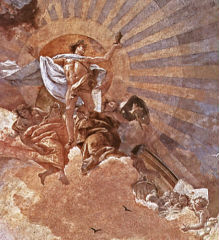
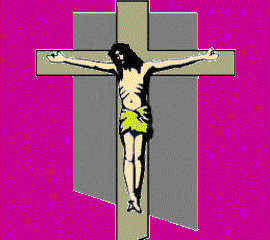
II. Religion
ABOVE ARE DEPICTED two conceptions of the Divine. Both are
anthromorphic, as Western man cannot conceive of "God" not looking like a
human. ("If cows had gods, they'd look like cows," an astute Greek Cynic
commented centuries before the sado- masochistic event depicted at the right
supposedly took place.) Both alleged depict the "Son" of the Transcendental
Divinity (called Zeus [pronounced "zDay-üs"] in Greek and YHWH [pronounced "Yah-way"] in Hebrew).
The one is called "Apollo" (as seen by Tiepolo), the other "Christ Crucified" (in a clip-art simplification). What a difference between them! Both reflect the origins of its conception. Apollo was conceived in vitality as a Celebration of Life. Christ was spawned in resentment as a Negation of Carnal Existence.(1) The Xian message of "Pie in the Sky" was extremely attractive to the down-trodden segment of Roman society: "You may be a slave now, but in the World to Come, you will be blessed for all Eternity, while the fat-cats will roast in Hell." The perversity of this metaphysic cannot be to over emphasized. (Marxism was a determinist adaption of this ethic: instead of Pie in the Sky, it was supposed to be Pie NOW! The result would have horrified Marx: a tyranny unprecedented in human history, which eventually imploded because of its inherent contradictions. The promulgators of "-ism"s refuse to accept human nature for what it is!) Xianity would have gone nowhere, had the rabble of the Empire been its only adherents. The "Litter Liberals" - those of enormous wealth, who went about in litters carried by slaves - were drawn to it, because of taedium vitae: despite their vast wealth (and Roman society of the late Empire was extremely polarized: no more than 5% of the population controlled at least 80% of the total worth), there was an inner lacking, unfulfillment. [St.] Helena, the mother of Constantine was one of the most
avid (or rabid) Litter-Liberals. She went trapesing off to Palestine, where
she "found" the True Cross and the Seamless Robe (which was in remarkably
sound condition for a garment 300 years old.
This isn't about the history of the waning Roman Empire - that's discussed
elsewhere - rather about my religion. I suppose it's an echo of George
Santayana, the great Spanish-born, American-educated philosopher, who spent
his last years in a monastery in Rome: "There is no god - and Mary is His
Mother!" What, of course, he meant was a rejection of revealed religion, but
an affirmation of the cultural values of Catholicism. As Apollo was
the God of Culture par excellence, you might say that I follow Toland's
proposal of using the Latin liturgy to pay homage to Apollo.
The pre-Vat-II R.C. Church, of all the Xian denominations, contained the
largest residue of Euro-
man's Natural Religion, before the imposition of "the Hellenic Export Model of
Judaism." True, the gods were gone, but the idols still remained. They were now "saints" (the most colorful of
which fell victim to that ecclesiastical lemming-run known as "Vat-II"). The
Olympian Trinity of
Zeus - Athena - Apollo became the Xian Trinity of Father - Holy Spirit - and
Son (Christ). The
panoply of female goddesses were subsumed into the figure of Mary, who after
the revival of the
Marian cult (circa 1,100 c.e.) virtually overshadowed her that of her divine
Son.
The R.C. Church in the U.S. has, since its introduction, been under the
thumb of the Irish,
and Irish Catholicism is heavily scarred by Puritanism. By ~1,500, the
Renaissance was in full
flower. Michelangelo created a new statue of Antinous, calling it "David."
(The original frescoes
of the Sistine Chapel were totally nude. A later Pope took exception in
looking up from the altar
to see bevies of young hunks dangling their pendula and had a painter
affix wispy veils
over the offending anatomy.) Then came Luther ... but Marcus Ely Ravage and
(far more
importantly) Nietzsche have addressed that reactionary phenomenon better than
I could hope
to.
Small wonder then, that in Italy and the Catholic German regions, the
revived paganism of
Mussolini and the former choir-boy Adolf Hitler were received with the
greatest enthusiasm. The
revolution in Russia had denied that man possessed a soul. He was simply a
"mechanicus;"
therefore, the "elimination" of 10 - 20 million "defective" robots was akin
to, say, Ford recalling millions of automobiles.
The Fascists, on the other hand, saw Western man under chafing under an
alien spirituality,
and sought a return to the mores of Antiquity, with Sparta playing a major
role in the National-
Socialist Weltanschauung. Mens sana in corpore sano found its
expression in the
Strength-Through-Joy spectacles, the "invigorating" art of Arno Brecker and
his school, along
with Mussolini's leveling a third of Rome, to uncover the buried glories of
the lost Imperium.
Can one seriously maintain that nearly 100 million people
would adopted the Roman salute, standards and auxillia of
the legions in a
matter of a few dozen months, if the impetus weren't buried in their
souls? As both Ravage and Steiner delineated, anti-Semitism is isomorphic to
the resentment of an AIDS victim toward the carrier of the HIV-virus. While
Constantine and his ding-bat mother may have disseminated the disease, the
Jews themselves remained immune to it. The Diaspora proved that as long as a
people remain true to their indigenous culture, they can re-establish
themselves.
What does this have to do with religion? Mainly it's showes
the endurance of Race-Memory and that "religion" is bound up with ethnic
identification. (Rabbi Mordecai Kaplan understood this completely, when in
1945 he shocked the Jewish establishment by stating that the Torah was their
"Illiad," [or Eddas] and that the Jews weren't a "chosen" anything; but that
Judaism constituted a distinct civilization.)
"God" is simply the word one uses to personify The Unknown. Western Man
has chosen to personify this concept by assigning a human - or humanoid - image to it. Our early Roman ancestors (and not just the Romans) were free from this deceptive habit. They were essentially
animists, who associated a distinct "numen" [vide: Numina for clarification] every item and action of significance. (There were so many numina that our
word "numerous" is derived from these Roman spirits.)
Science would reduce the pantheon to two: RNA and DNA. "The Eternal Golden
Braid" is a
poetical name ascribed to the Double-Helix. Another answer in the parade of
answers, but
spiritual unsatisfying. We'd rather not think of ourselves as
"actualized
programs"; furthermore, the latest answer doesn't address the question as to
Who (or What)
dictated Don Giovanni to Mozart, as this sublime masterpiece was
brought into Being
between billiard shots.
My Religion - after all, this posting is entitled "My Philosophy" - is
that "God" is
the appellation given to The Unknown. I specifically reject the
Judeo-Xian
contention that Man is inherently "evil" or that "God" is "The Great Realtor
in the Sky"
who singled out a scrubby portion of the Levantine Coast as "His" Holy Land.
(On who many
planets in how many galaxies are there creatures very much like us, who have
their
"sacred places"? That remains part of The Unknown and hence Divine.) We're
best to follow
the admonitions of Epicurus and cultivate good friends in harmonious
surroundings: far
more intrinsically satisfying than places of pilgrimage or their modern
substitutes: theme
parks.
III. Ethics
Every great thinker, who has addressed the questions of what is Right
and
Wrong behavior has ended up with "The Golden Rule," often however
expressed in extremely divergent formats. Confucius phrased it as a prohibition:
"Do not subject others to acts you would not want inflicted upon you." Kant stated it
as a mandate, The Categorical Imperative (paraphrased): "One must behave as
he would have everyone else behave, under the same circumstances." Rabbi Hillel, a
Jewish teacher of Roman times, is credited with the following reply (legend holds to a Greek,
who asked Hillel explain the corpus of Jewish law while the Greek stood on one foot):
"Love God above all things and your neighbor as yourself. That is the whole Law; the
rest is merely commentary."
Socrates and the Greeks who followed him denied the existence of evil, per
se. Error ("sin," call it what you will) ensued from the pursuit of what men
thought was good, but were wrong. This paradox that evil ensues from
error has been
amplified virtually beyond endurance since 1789. [If the reader requires Examples, there are plethora of
them drawn from recent history - and no indication they've been exausted.]
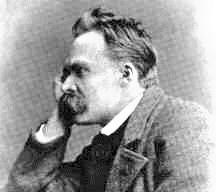 It wasn't until the 19th century that Friedrich
Nietzsche (whose true worth is only now
beginning to be
appreciated) grappled with the Socratic paradox and postulated there is no
such thing as a
"universal moral code," rather the need for a typology of morals. The
primary
divisions are the "Master Morality" and the "Slave Morality." The Master
Morality is
inner directed (chief danger: hubris); the Slave Morality is
outer
directed (origin: resentment). Rather than The Golden
Rule, which one may have recourse to in the abstract, the French maxim
"chaqun à son goût!," with a decent respect for the morality of
others, had been the
basis of my ethics before discovering Nietzsche masterful delineation of it,
which served
to convince me of the correctness of my position.
It wasn't until the 19th century that Friedrich
Nietzsche (whose true worth is only now
beginning to be
appreciated) grappled with the Socratic paradox and postulated there is no
such thing as a
"universal moral code," rather the need for a typology of morals. The
primary
divisions are the "Master Morality" and the "Slave Morality." The Master
Morality is
inner directed (chief danger: hubris); the Slave Morality is
outer
directed (origin: resentment). Rather than The Golden
Rule, which one may have recourse to in the abstract, the French maxim
"chaqun à son goût!," with a decent respect for the morality of
others, had been the
basis of my ethics before discovering Nietzsche masterful delineation of it,
which served
to convince me of the correctness of my position.
My ethics focus upon a restoration of Euro-Awareness and unwavering
loyalty to MAGNA
EUROPA, the only entity to which I have sworn allegiance. The European High Culture and
its concomitant Latin tongue are the bed-rocks of my Race-Culture.
For me, that is the
Whole Law; the rest is merely commentary!
IV. Politics
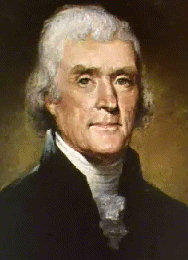 Were he alive today, the Sage of Montecello would be dismayed at the course of events
that beset his dream of A New Rome in the New World. No one was more firmly
convinced that
Slavery must be ended, but
that
integration was out of the question. Once manumitted, the Negroes should be
resettled in
their own state, enjoying the protection and sponsorship of the U.S., until
they were able
to go it on their own. (Abraham Lincoln was of the same opinion; however,
Lincoln was
adamant that it should be located in Africa.) Large-scale democracy has
never
worked. It was the Athenian democrats who executed Socrates and drove Plato
into exile,
brought on the Peloponnesian War, massacred the inhabitants of Melitus, and
undertook the
disastrous invasion of Sicily, which led to the destruction of the Golden Age
of Greek Culture.
Were he alive today, the Sage of Montecello would be dismayed at the course of events
that beset his dream of A New Rome in the New World. No one was more firmly
convinced that
Slavery must be ended, but
that
integration was out of the question. Once manumitted, the Negroes should be
resettled in
their own state, enjoying the protection and sponsorship of the U.S., until
they were able
to go it on their own. (Abraham Lincoln was of the same opinion; however,
Lincoln was
adamant that it should be located in Africa.) Large-scale democracy has
never
worked. It was the Athenian democrats who executed Socrates and drove Plato
into exile,
brought on the Peloponnesian War, massacred the inhabitants of Melitus, and
undertook the
disastrous invasion of Sicily, which led to the destruction of the Golden Age
of Greek Culture.
Rome expelled the Etruscan kings and instituted a republic, which
was far more
oligarchic than democratic. The Romans voted by tribe, not by
individual. The Senate was a Collective Executive. One had to meet a means
test and be of the
senatorial class to gain admission - at least initially. The strength of Rome
lay in its
yeomanry: the citizen-soldier, who fought for farm and family. The urban scum,
with no
interest in the preservation of the city, was exempt from military service.
Rome grew not only by conquest, but also by the formation of alliances. The
wars with Carthage
marked the turning point in Roman history. The defeat at Cannae was so
decisive that it
seemed impossible Rome would not sue for peace. Not only did the defiant city
not sue for
peace, she even refused to ransom those Romans taken prisoner.
None of this was new to Jefferson or the others. The original Articles had
created a
central government weaker than the Holy Roman Empire. Each state had one vote
in the
unicameral Congress. The first President of the United States, one Hanson,
eventually got
his picture on a postcard, but is hardly known. The Constitution replaced the
Articles, but many - including Patrick Henry - were adamantly opposed to any
increase in
the power of the central government. Hamilton wanted a monarchy. At least
monarchies
worked. The Roman Republic had lasted less than 500 years, but Rome as
a de-facto
monarchy had struggled on, in one form or another, for 1,500 more years.
(Gibbon's Decline and Fall ends with the fall of Constantinople, in
1452 c.e.) In fact, it still
continued, but Islamic in religion, controlling all that had been the Eastern
Roman Empire
and in North Africa, much of what had been in the West.
Jefferson got his "New Rome," but what slaves had done to Old Rome, the
machine was to
do to the New. A plutocracy arose to dominate the "Republic," which proceeded
to impose
itself on the rest of the planet, issuing in the Pax Americana and the
multi-national
Imperium Vulgarum. The difference between the Old Rome and the New, is
that ancient
one welcomed the civilizing influence of Greek culture: fluency in Greek was
the hallmark
of the educated Roman. In place of temples to Rome and Augustus are ... banks.
The Imperium Vulgarum is dotted with Disneylands. "Are We Having Fun
Yet?" has replaced "Know Thyself!"
In so far as it exists at all, the uncorrupted Civilization of the West is
confined to catacombs. The Great Levelers, the Diversity-Mongers: media robots
and vectors of that Spiritual AIDS called "Multi-Culturalism" have firmly
established the Dictatorship of Last Man, whose morality reeks of resentment toward Euro-accomplishment and Euro-enlightenment.
Nietzsche was the penultimate Great Thinker to arise among the Germans. The last was Oswald Spengler, who discovered the organic nature of High
Cultures: a discovery as profound as that of Copernicus. Politically, my
aspirations lie in a return to the fundamental guidance of Hesiod and the Eddas, following the admonition of Thomas Carlyle to "Find the best man and make him King!" Jefferson's dream, however noble, has turned out to be illusory.
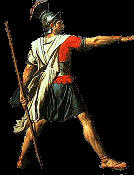 FINIS!
FINIS!
DEFINITIONS:
Paradox [Greek: beyond belief, incomprehensible] ensues when two (or
more) contradictory axioms are presented. Consider a slip of paper: on
the obverse is written,
"The statement on the other side is TRUE!"; while the reverse states, "The
statement on the otherside is FALSE!" A prime example of a paradox. Russell's
Paradox (named after Bertrand Russell) ensued from an esoteric proposition in
Set Theory. Russell and Whitehead had undertaken the compilation of the entire
system of mathematics - the famous Principia Mathematica [1912] - which
was to be free of paradoxes; however, Russell founded that impossible. Goedel showed why. BACK!
Numina: the formless, sexless spirits present in every place of
significance. One's titulary spirit was called the "lars" (becoming the
"Guardian Angel" in Xian mythology). The "lares et pentares" were,
collectively, the guardians of the whole familia. "Vespa" guarded the
hearth, the symbolic heart of the household. As the Roman people [populus
romanus] viewed themselves as one extended family, the National
Hearth - The Temple of Vesta - was tended by the Vestal Virgins (precursors of
Xian nuns, whose vow of virginity lasted thirty years, not for life). The
custom of a groom carrying his bride over the threshold dates from Roman
times. The bride had to first be "introduced" to the lares et pentares, as she
now a member of her husband's familia.) BACK!
Examples: Were the Brits and Yanks, who turned Dresden into the most
artistic bonfire in history -
while snuffing out the lives of more people (mainly women, children, the
wounded and
Allied POWs) than had been killed in the conquest of France in 1940 - "doing unto
the Germans, as they would like the Germans to do unto them"? What about Hiroshima
and Nagasaki (the latter being "The Final Solution" to Japan's Christian population,
almost all of whom lived in Nagasaki)? And the horrors of the Concentration Camps? Had the
people, who had produced a Goethe, a Mozart, been transmogrified into sadistic demons? ...
and these pale into insignificance when compared to Stalin and Mao! In every case, and in every instance, we see the results ardently striving in error. BACK!
Friedrich Nietzsche [1844-1900]: The penultimate monumental German
philosopher saw
that the Road Into the Abyss was paved with Egalitarianism and smoothed with the ballast of
Nationalism. Nietzsche considered his monumental Also Sprach
Zarathustra ["Thus
Spoke Zarathustra"] an antidote to the slave-mentality inherent in
Christianity. He
clearly saw that Demo-Fraud was leading to Annihilation Wars and the advent of
Last Man: homo bovinus, the mindless, cultureless creature wallowing in
conformity and
hedonism: "Everybody wants the same, is the same: one herd with no shepherd. Anyone
holding different opinions voluntarily enters a madhouse." An avid Darwinian, he lauded
the cult of the Over-Man, a quantum leap of evolution. His disgust with rising German
nationalism and inchoate anti-Semitism (which he loathed) caused him to live as a quasi-
hermit in the Swiss Engardine, until a neurologic collapse resulted in catatonia. BACK!
Slavery: Actually serfdom, for slavery as it was known in the
Ancient World
never existed in the New. A cousin of Jefferson's was hanged for killing a slave, while in
Ancient Rome it wasn't until the Nero that a master was forbidden to kill a slave, without
first securing formal condemnation from a magistrate; and it was Diocletian who banned the
castration of slaves. The gross distortion of the lot of Negroes in the South is part of
the ceaseless defamation of Euros everywhere. Do the Multi-Cultural
"Mongrolians" point
out that those Negroes who weren't sold were disposed of by their
Afro-vendors, by being pushed off a cliff into the ocean? Of course not! Do they draw attention to the lot of the
"free" Euro workman in New England mills: 12 - 14 hour days, that started when a child was five? Of course not - and those who do are relentlessly persecuted. The tyranny of the "politically correct" is as repugnant as any other inquisition. They prattle "diversity," but demand conformity! Even as the Inquition demanded that Galileo recant did not stop the Earth from moving, the machinations of the Thought Police will not supress the Truth. Solutions to problems must be based upon Fact. As the great Jefferson stated, "We can tolerate any error of opinion, if Reason is left free to correct it."
BACK!
DIGRESSIONS
1) For a full delineation of this premise, a digression to Marcus Ely Ravage's "Jewish Influences" is advised. At the end, hit the "Back" button on your Browser to return here. Do NOT follow the "Go Back!" link, or you will become hopelessly lost in the labyrinth of these web-pages!
BACK!
|